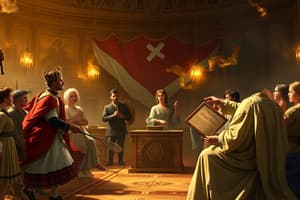Podcast
Questions and Answers
When and where did the Tennis Court Oath take place?
When and where did the Tennis Court Oath take place?
On July 1789 at an indoor Tennis court in Versailles in France.
What was the Tennis Court Oath?
What was the Tennis Court Oath?
The newly formed National Assembly pledged to stay until they had drawn up a new constitution.
Who is associated with the Tennis Court Oath?
Who is associated with the Tennis Court Oath?
The National Assembly composed of the Third Estate delegates.
What is important about the Tennis Court Oath?
What is important about the Tennis Court Oath?
Why was the Tennis Court Oath significant?
Why was the Tennis Court Oath significant?
What was the existing social-political system in France?
What was the existing social-political system in France?
What were the Three Estates in France?
What were the Three Estates in France?
Why was the Third Estate unhappy?
Why was the Third Estate unhappy?
What economic factors contributed to the Third Estate's situation?
What economic factors contributed to the Third Estate's situation?
What did King Louis XVI want to do to pay off debt?
What did King Louis XVI want to do to pay off debt?
How did the Second Estate respond to King Louis XVI?
How did the Second Estate respond to King Louis XVI?
When was the Estates-General held?
When was the Estates-General held?
How had the Estates-General worked since medieval times?
How had the Estates-General worked since medieval times?
What change did the Third Estate want in the way the Estates-General was run?
What change did the Third Estate want in the way the Estates-General was run?
How did King Louis XVI respond to the Third Estate's demands?
How did King Louis XVI respond to the Third Estate's demands?
How did the Third Estate respond to King Louis XVI's refusal?
How did the Third Estate respond to King Louis XVI's refusal?
What happened three days after the National Assembly was formed?
What happened three days after the National Assembly was formed?
Flashcards are hidden until you start studying
Study Notes
Tennis Court Oath Overview
- Occurred in July 1789 at an indoor tennis court in Versailles, France.
- Involved the National Assembly being locked out of their meeting room, leading to the oath.
National Assembly Formation
- Formed three days prior to the Tennis Court Oath.
- Comprised delegates from the Third Estate, educated individuals influenced by Enlightenment ideals.
Significance of the Oath
- Marked the end of absolute monarchy and the start of representative government in France.
- Signified the beginning of the French Revolution and a demand for constitutional reform.
Social and Political Context
- France operated under a three estate system, where everyone was subject to the king.
- Rights and status were determined by one's estate, with social privileges heavily skewed towards the First (clergy) and Second (nobility) Estates.
The Estates System Inequality
- First Estate: clergy, held significant privileges including tax exemptions.
- Second Estate: nobility, also enjoyed privileges and high office access.
- Third Estate: included the working class and peasants, bore the tax burden and had limited rights, fostering resentment.
Economic Contributors to Unrest
- France's economy was declining due to past debts from previous monarchs and conflicts.
- Extravagant spending by King Louis XVI and Queen, combined with costly wars, worsened economic instability.
King Louis XVI's Tax Reform Attempt
- Faced with debt, the king sought to impose taxes on the nobility but was denied by the Second Estate.
- The Second Estate pressured Louis to convene the Estates-General to discuss taxation.
Estates-General Meeting
- First meeting in 175 years took place on May 5, 1789, at Versailles.
- Historically dominated by clergy and nobles, who could outvote the Third Estate.
Third Estate Demands
- Sought a unified assembly where all delegates had individual votes for fair representation.
- Emmanuel-Joseph Sieyès advocated for the formation of the National Assembly to represent the people.
King Louis XVI's Rejection
- Refused the Third Estate's request for a reformed voting process in the Estates-General.
- This rejection prompted the Third Estate to take decisive action.
Immediate Action Post Formation
- On June 17, 1789, the National Assembly was formed.
- The Tennis Court Oath was executed just three days later, signifying commitment to constitutional reform.
Studying That Suits You
Use AI to generate personalized quizzes and flashcards to suit your learning preferences.




